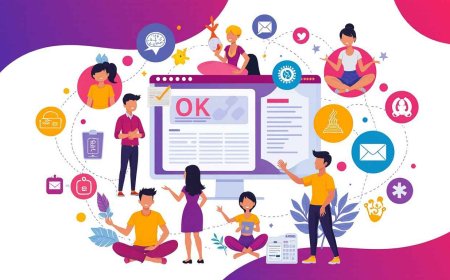AI Customer Service Software: What to Expect in the Next 5 Years
Discover how AI customer service software is evolving and what innovations to expect over the next 5 years.

Artificial Intelligence (AI) is reshaping every industry it touches and customer service is no exception. In the last decade, we've seen AI evolve from simple chatbots to advanced conversational agents capable of understanding context, sentiment, and complex queries. But what does the future hold?
Over the next five years, AI customer service software will undergo a rapid transformation, bringing unprecedented changes to how businesses interact with customers. This article explores emerging trends, technological advancements, and the strategic shifts companies should expect in the next half-decade.
1.From Rule-Based to Contextual AI
The early versions of AI-powered customer service relied heavily on rule-based decision trees. These systems could only respond to pre-programmed questions and lacked flexibility. The next wave of AI software is context-aware, thanks to advances in Natural Language Processing (NLP) and deep learning.
Over the next five years, we can expect:
-
Hyper-personalized responses based on customer history, preferences, and behavior.
-
Multi-turn conversations that remember prior messages in a session.
-
Context switching where AI can handle abrupt topic changes seamlessly.
These advancements will make interactions with AI more natural and human-like, boosting user satisfaction and reducing escalation to human agents.
2.Multimodal Support Will Become the Norm
Today's AI systems primarily rely on text-based interfaces like chat or email. But in the coming years, well see an explosion in multimodal AI systems that can understand and respond using voice, video, images, and even biometric signals.
Imagine a support system that can:
-
Diagnose a hardware issue via a photo or video submitted by the customer.
-
Assist through voice while analyzing visual cues for emotional state.
-
Use screen sharing or AR overlays to guide customers through complex tasks.
This shift will redefine the customer experience, especially in sectors like tech support, healthcare, and retail.
3.Proactive and Predictive Assistance
Reactive support will give way to predictive and proactive customer service. With AI analyzing usage patterns, sentiment trends, and contextual data, businesses can anticipate issues before customers even reach out.
Examples include:
-
A SaaS platform offering help when it detects unusual user behavior.
-
Telecom companies notifying users about service outages before they ask.
-
E-commerce platforms suggesting solutions for delivery delays automatically.
By addressing problems before they escalate, companies can significantly reduce churn and increase customer loyalty.
4.AI-Augmented Human Agents
AI isnt replacing customer service agents its empowering them.
In the next five years, expect to see a rise in AI-augmented agent platforms, where AI provides real-time suggestions, drafts responses, and highlights customer sentiment during live interactions.
These tools will:
-
Reduce average handle time (AHT) by surfacing relevant knowledge.
-
Enhance first-contact resolution by suggesting best-next actions.
-
Increase agent confidence and reduce burnout, especially for complex cases.
By blending the empathy of humans with the efficiency of AI, businesses can offer a truly hybrid service experience.
5.Emotionally Intelligent AI
While todays chatbots often fall short in understanding tone or emotion, future systems will be emotionally intelligent.
Advances in affective computing and sentiment analysis will enable AI to detect:
-
Frustration or anger from a users tone, choice of words, or typing speed.
-
Confusion through repeated questions or delays in response.
-
Positive emotions that can be leveraged to upsell or offer loyalty rewards.
Emotion-aware AI will help tailor interactions in real-time offering empathy, switching to a human agent when needed, or adapting its language to suit the users emotional state.
6.Omnichannel Consistency Powered by AI
Consumers now interact with brands across multiple channels website, social media, mobile apps, phone calls, and even smart devices. The expectation is seamless, consistent support across all touchpoints.
AI will become the central nervous system of omnichannel service. It will:
-
Maintain a unified customer profile across channels.
-
Ensure consistent tone, context, and personalization regardless of where the conversation starts.
-
Route and escalate issues intelligently based on urgency, platform, or history.
As AI matures, the days of repeating yourself across channels or receiving inconsistent information will be over.
7.Data Privacy and Ethical AI Will Take Center Stage
With great power comes great responsibility. As AI becomes more embedded in customer interactions, questions around data privacy, bias, and transparency will grow louder.
Over the next five years, expect:
-
Tighter regulations around how customer data is collected and used by AI.
-
Increased demand for explainable AI systems that can justify their decisions.
-
Bias audits to ensure fairness in AI decision-making.
Businesses that prioritize ethical AI practices and transparency will earn greater trust and long-term loyalty from customers.
8.Low-Code/No-Code AI Platforms for Customization
Building AI customer service solutions no longer requires a team of data scientists. The rise of low-code and no-code platforms is democratizing AI development.
Customer service leaders will be able to:
-
Customize AI workflows using drag-and-drop interfaces.
-
Train chatbots on company-specific data without writing code.
-
Deploy new services rapidly, adapting to changing customer needs.
This shift will empower non-technical teams to innovate faster, reduce dependency on IT, and stay ahead of evolving customer expectations.
9.Deeper Integration with Enterprise Systems
AI customer service software will no longer operate in silos. Instead, it will become deeply integrated with:
-
CRM platforms (like Salesforce or HubSpot) for unified customer insights.
-
Order management systems to resolve e-commerce queries in real-time.
-
HR and IT systems for internal support automation.
These integrations will allow AI to act not just as a support tool, but as a workflow orchestrator, resolving queries end-to-end with minimal human intervention.
10.AI as a Brand Differentiator
Finally, well see businesses using AI not just to cut costs but as a key differentiator in their brand experience.
Think of:
-
A hotel chain known for its AI concierge that remembers your preferences.
-
A bank that solves 95% of queries within seconds through voice AI.
-
A retail app with a virtual assistant that styles outfits based on your calendar.
Customer service is becoming a competitive battlefield, and those who embrace next-gen AI will set themselves apart.
Conclusion
The next five years will usher in a new era for customer service one defined by intelligence, empathy, and personalization. Businesses that invest in next-gen AI solutions will not only improve operational efficiency but also build stronger, more loyal relationships with their customers.
From predictive support and emotional intelligence to omnichannel integration and ethical AI, the transformation is already underway. Companies that want to stay ahead must begin planning now, embracing the tools and platforms that will define tomorrows service experience.
Whether you're a startup or an enterprise, one thing is clear: AI Customer Service Software will be at the heart of exceptional customer experiences in the years to come.




























